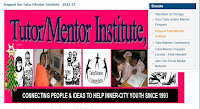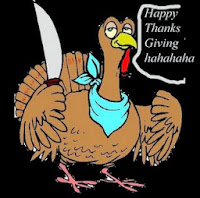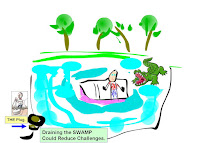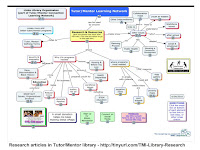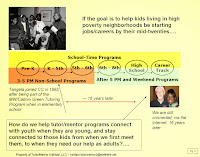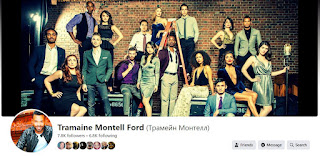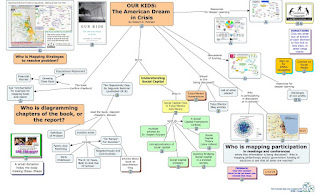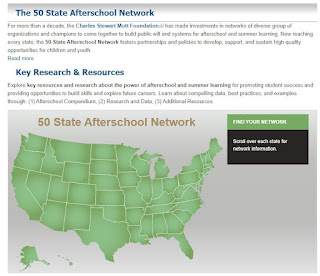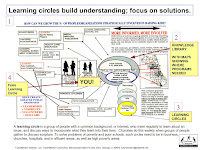I encourage you to view the short video on the home page of the Open Referral website to understand the important work they are doing and the problems they are addressing.

Greg's group has been bringing people together since 2012 to talk about the challenges of building and maintaining information directories and to "create a common set of data standards, that define and structure information, so that it can be readily transferred between systems". Read through the
FAQ questions and answers on the Open Referral website to understand this better.
View Greg's Nov 15 presentation to ChiHackNight.
click here
That means many distributed directories could be connected in larger directories, making more information available to more people.
The Tutor/Mentor Connection, which I and a few others created in 1993 and launched in 1994, has been collecting information about Chicago area volunteer-based tutor/mentor programs for 30 years, along with building a library that represents the ecosystem of research, resources, funding, businesses and everyone else who needs to be involved in helping kids in poverty move more safely from birth-to-work.
We published our first printed directory of Chicago tutor and mentor programs, and the ecosystem of those who support them, in 1994 and updated it annually through 2003. After that all of our information was put on-line.
We had others ask us to share the data, but who never offered to help pay the costs of collecting and maintaining it. I never did this for fear of the larger organization eliminating the need for our work, and then at some point in the future, ceasing operation, so none of the data we had been collecting would remain available.
Furthermore, if our data was owned by a national organization, the people who managed it would not have local passion, or local purpose, to use the data regularly to help existing programs constantly improve, nor to help new programs form where data analysis showed more were needed.
That was why we were collecting the information in the first place!
Thus, I proposed there be a decentralized collection of data that was shared in a system similar to what Greg has been working on. Back in the 1990s the technology, or motivation, to do this was not available.
Thus, I fully understand the challenges Greg describes. For the past 10 years I've been a one-person army trying to maintain the library, share it, and get people to talk to myself, and each other. If you read though this blog you can find hundreds of articles that relate to this.
Bringing people together.
When we were planning the Tutor/Mentor Connection in 1993 and talking about building a directory our PR partner from Public Communications, Inc. in Chicago, said "You've got to host a conference!".
Using the contact information from organizations we learned about through our survey and our networking, we hosted a first Tutor/Mentor Leadership and Networking Conference in May 1994 and hosted one every six months after that until May 2015, at which time I had to stop due to lack of money.
In
this article you can see a map showing participation over 20 years. Here's
a presentation showing how universities hosted these conferences and how I reached out to them for many years. Between 1996 and 2002 attendance ranged from over 150 to over 300. Our mailing list grew from 400 to 14,000. This represented quite a large ecosystem, yet, it was not attracting business, philanthropy, government or university participants. Thus, there were always too few of "the right people" to fully build the Tutor/Mentor Connection to what I hoped it would accomplish.
Since forming the Tutor/Mentor Institute, LLC in 2011 the range of people I've been reaching dramatically declined and conference participation dropped to around 100 per event.
So let me sum up.
1) the world is dealing with complex problems and some people are creating great visualizations showing this complexity;
2) some people recognize the difficulty of collecting and sharing social service information and are trying to innovate new solutions;
3) knowing "who" should be included in a directory, or in an "invitation list" is part of the problem in a big city like Chicago; getting them to come to "your event" or into "your conversation" is a huge challenge if you're not well-connected, or have a reputation that draws people to you. Getting into "their conversations" and "being heard" is just as difficult.
4) I find very few people creating visualizations of who should be connected, or who they are bringing together via their events.
5) even if you have a list of "who" unless you do some sort of network analysis of event participation and/or social media conversations, you don't really know how well your network is connecting.
I'm sure readers might list more problems. I'd love to hear from you.
This has already been a long article, but if you've made it this far I encourage you to go one article further. Review the 4-part strategy described in
this concept map.
The "information collection" described in this article is just STEP 1. Getting people to look at the information (step 2) and helping them understand it (step 3) and use it (step 4) also need to be funded and supported as part of any problem-solving process.
Thanks for reading. I hope you'll share this. I'm on Twitter, LinkedIn, Instagram, Facebook and Mastodon. (
see links here). Let's connect.

